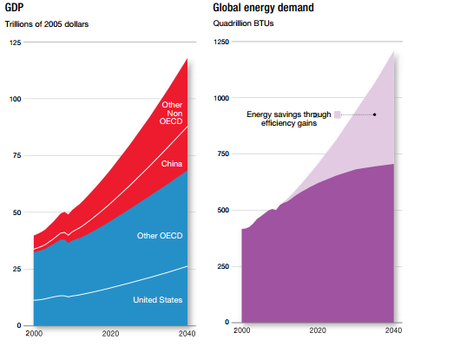
ExxonMobil might not be the best source of unbiased energy projections, but its 2013 Energy Outlook to 2040 gauges the progress of several inevitable trends that will develop as the world becomes more populated, industrialized, and energy hungry.
As you might expect, population is fundamentally, though not linearly, linked to energy consumption. Exxon projects that the world’s population will rise by more than one-quarter to 9 billion by 2040. Along with the population expansion, it is projected that the global economy will expand at an average rate of 2.8 percent annually, while global energy consumption will increase by 35 percent. These numbers tell us at least two things: per capita energy consumption will increase (by roughly 25 percent), but the energy intensity (the amount of energy required to produce one unit of GDP) is decreasing.
As you can see in the graphic below, efficiency gains play a substantial role in Exxon’s outlook.

It is also no surprise that the greatest efficiency gains will be made in the wealthiest countries. Exxon projects that energy demand for members of the Organization for Economic Co-operation and Development (OECD) will be virtually flat to 2040, despite 82 percent growth in economic output. Flat energy demand is attributed to the availability of energy-efficient products and vehicles, as well as more efficient facilities and industrial processes.
Plateauing energy demand in developed countries in in contrast to the trend in the developing world. With average annual GDP growth of 4.4 percent, Exxon forecasts that by 2040 energy demand will rise by 65 percent, making the developing world twice as energy hungry as developed countries. Even while non-OECD members are projected to reduce energy intensity by more than half (from roughly 22 to 10 BTUs), it will still be triple the energy intensity of the OECD members.
Growing energy demand and high energy intensity in the developing world raises some important questions regarding climate change: Are developing countries able or interested in reducing energy consumption greenhouse gas emissions? And, does the developed world have an obligation to assist poorer countries become more energy efficient?
The sad truth of this situation, as pointed out in the book, “Greenprint: A New Approach to Cooperation on Climate Change,” is that developing countries are the least equipped to adapt to climate change. Furthermore, meaningful cooperation between the two economic spheres will likely continue to remain elusive. The authors propose that one of the central barriers to action is the “narrative problem,” causing rich and poor countries to think of carbon emissions in self-serving, historical terms, with each placing the blame/onus on the other.
While the Exxon Outlook speaks little of global warming, the report nonetheless emphasizes the need for a new, collaborative international effort to address climate change.
Turning the Tide on Climate Change, by LucAleria/ CC by 3.0




